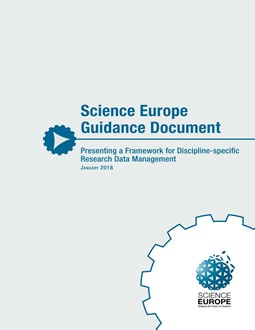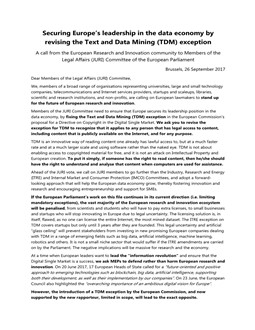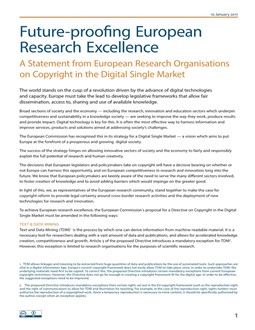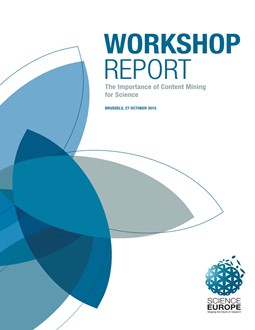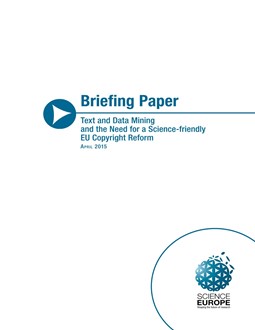Member-only content is available on this page. Please log in to view this content.

What's going on?
34 item(s) found
Guidance Document Presenting a Framework for Discipline-specific Research Data Management
Research organisations and funders increasingly ask researchers to create Data Management Plans for their work and proposals. A lack of standardisation means that these can be time-consuming to create and difficult to compare and evaluate. Science Europe presents a framework for the creation of domain-specific protocols that can be used as standardised templates, reducing the administrative burden on both researchers, research organisations, and funders.
Science Europe Welcomes Efforts Towards European Open Science Cloud
Science Europe welcomes the efforts made towards the European Open Science Cloud (EOSC). In this open letter, the Governing Board of Science Europe reinforces its view that research data should be permanently, publicly, and freely available for re-use. The proposed EOSC aims to further this goal but a number of important questions still remain.
Securing Europe’s Leadership in the Data Economy by Revising the TDM Exception
This open letter, signed by the European Research and Innovation community, calls on Members of the European Parliament and the Council to secure Europe’s leadership in the data economy by revising the Text and Data Mining (TDM) exception in the draft of the Directive on Copyright in the Digital Single Market. It calls for the TDM exception to apply to any person that has legal access to the content to help the European data economy grow, foster innovation, and encourage entrepreneurship.
Joint Statement on Future-proofing European Research Excellence
LIBER Europe, CESAER, EUA, LERU, and Science Europe — who together represent hundreds of universities, libraries, and research funding and performing organisations — call on Members of the European Parliament to modify the current EU copyright reform proposal. Amendments in five main areas of the proposal are critical if Europe wants to be at the forefront of a prosperous and growing digital society. Europe must take the lead to develop legislative frameworks that allow fair dissemination, access to, sharing and use of available knowledge.
Position Statement on Research Information Systems
Science Europe is working to enhance the interoperability of research information systems. This publication sets out common principles to guide their development.
The Importance of Content Mining for Science
Text and data mining (TDM) is hugely important for science as it can facilitate better research and the free flow of knowledge across borders. This report urges policy-makers to update the legal framework in the context of the upcoming EU copyright reform in order to allow TDM for commercial and non-commercial means, and also to clarify the legal position surrounding it.
Briefing Paper on Funding Research Data Management and Related Infrastructures
This joint briefing paper with Knowledge Exchange informs the discussion on the funding of Research Data Management (RDM) and related infrastructures in Europe, helps raise awareness of the current challenges, and communicates opportunities for co-ordinated action to relevant stakeholders. The paper highlights that the funding of Research Data Infrastructures, enabling RDM, comes from a great variety of sources and institutions that have different responsibilities and that operate at local, national, and international levels.
Briefing Paper on Text and Data Mining and the Need for a Science-friendly EU Copyright Reform
Text and Data Mining (TDM) helps the analysis and extraction of new insights and knowledge from vast amount of digitally-available content. It offers great potential for research, but also for the economy and society as a whole since it enables innovation. This paper gives an overview of some of the legal hurdles faced by researchers using TDM practices, flags possible action lines for research organisations, and calls for a more science-friendly EU copyright law.
Science Europe Roadmap
The Roadmap, approved by the Science Europe General Assembly in November 2013, is Science Europe’s action plan to contribute to the elements of a successful research system. It acts as a framework for voluntary collective activity, providing a long-term strategy for the association. The ‘Priority Action Areas’ are those in which Science Europe members believe that there is a potential to achieve tangible and substantive progress, and where they can add real value by working together.

